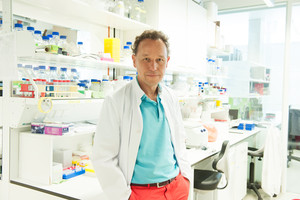Early signs of Alzheimer’s detected in cerebrospinal fluid

Christian Haass and coworkers have detected early signs of Alzheimer’s in the cerebrospinal fluid. Source: LMU
Researchers at the Munich site of the German Center for Neurodegenerative Diseases (DZNE) and the hospital of the Ludwig Maximilian University (LMU) Munich have now found an early immune response in individuals with a genetic predisposition to Alzheimer‘s: their brain’s showed abnormal immune reactions as early as about seven years before the expected onset of dementia.
These results demonstrate that in cases of Alzheimer‘s, inflammatory processes in the brain evolve dynamically and are precursors of dementia.
These immune responses can be detected by means of a protein in the cerebrospinal fluid, offering physicians the possibility to trace the progression of the disease. The study results are published in the journal “Science Translational Medicine”.
Original Publication
„Early changes of CSF sTREM2 in Dominantly Inherited Alzheimer’s Disease follow markers of Amyloid Deposition and Neuronal Injury“, Marc Suárez-Calvet, Miguel Ángel Araque Caballero, Gernot Kleinberger, Randall J. Bateman, Anne M. Fagan, John C. Morris, Johannes Levin, Adrian Danek, Michael Ewers, Christian Haass, Science Translational Medicine, DOI: 10.1126/scitranslmed.aag1767
https://www.dzne.de/en/about-us/public-relations/news/2016/press-release-no-23.h… Complete press release
Media Contact
All latest news from the category: Health and Medicine
This subject area encompasses research and studies in the field of human medicine.
Among the wide-ranging list of topics covered here are anesthesiology, anatomy, surgery, human genetics, hygiene and environmental medicine, internal medicine, neurology, pharmacology, physiology, urology and dental medicine.
Newest articles

“Nanostitches” enable lighter and tougher composite materials
In research that may lead to next-generation airplanes and spacecraft, MIT engineers used carbon nanotubes to prevent cracking in multilayered composites. To save on fuel and reduce aircraft emissions, engineers…

Trash to treasure
Researchers turn metal waste into catalyst for hydrogen. Scientists have found a way to transform metal waste into a highly efficient catalyst to make hydrogen from water, a discovery that…

Real-time detection of infectious disease viruses
… by searching for molecular fingerprinting. A research team consisting of Professor Kyoung-Duck Park and Taeyoung Moon and Huitae Joo, PhD candidates, from the Department of Physics at Pohang University…





















